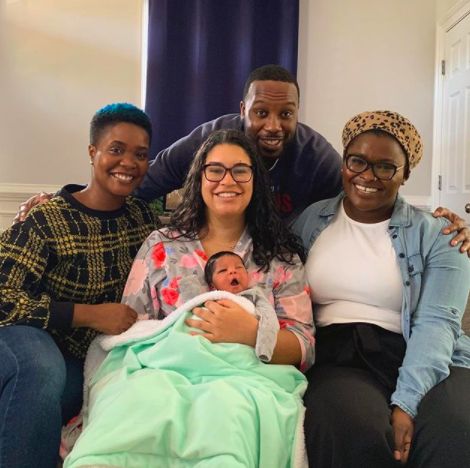Last week, I missed my first birth and I was devastated.
I’m naturally an empath and think of myself as a really good problem solver but this was just the perfect storm that I couldn’t make work.
Enter the guilt. I felt so bad for not being able to be there (even though we’d already discussed contingency plans since I knew I was traveling close to baby’s due date) and I could feel myself going into a space where I was trying to force something that just wasn’t meant to happen.
Then I remembered that, like I tell my mamas, the body already knows what to do. I’m grateful for my friend, sister and fellow doula @vanyacamille and the supportive relationship that we have built over the past few months (thanks @thelola_women!) because there was no hesitation when I asked her to step in to support my laboring mama. Little did she know, she was supporting me as well ✨
There are many times where I think I can do it all alone. Because I-N-D-E-P-E-N-D-E-N-T. Then life happens and I’m humbly reminded otherwise. Doula work can be exhausting and emotional, but building community makes it so so sweet.
One of the most common questions that I get is “can I have sex while I’m pregnant?”. The answer is YES—have all the consensual sex your heart desires! (UNLESS you have been diagnosed as a high risk pregnancy and your physician has instructed you to refrain. In which case, explore other safer methods of pleasure!) .
Sex during pregnancy is great for a number of reasons:
it’s a great bonding tool for you + partner
it’s a great way to feel sexy and grow confidence in your changing body
nipple stimulation encourages labor and strengthens contractions
orgasms release adrenaline which can reduce stress during pregnancy and labor
the hormone that starts contractions is oxytocin, which is the hormone that is released during orgasms
if partner is male, semen contains natural prostaglandins that help to soften the cervix, causing it to open
Positions can be tricky as baby + belly grows so be sure to get creative with which ones make you the most comfortable. Laying on your side or on all fours tends to be preferable—use lots of pillows! And don’t trip, your growing baby is protected in the womb and surrounded by shock absorbing amniotic fluid 😉
Growing up in Georgia, comprehensive sex education was virtually nonexistent in schools, but surprisingly, we did have a couple days of science-based sex education (with some conservative, Bible belt undertones, of course) when I was in middle school. We took a field trip to the Fernbank Science Center (I still love that place!), separated by sex, and learned about puberty, fallopian tubes, zygotes, and periods.
I’ll be honest though, the bulk of what I learned about sex came from sneaking and watching porn during my adolescent years. It wasn’t until fairly recently that I realized just how much those white male dominated narratives presented themselves in my own perceptions of what it meant to give, receive, and experience pleasure. Not to mention the lessons that I accepted around “ideal” body shape, size, and even body hair! The lies of capitalism and patriarchy can be pervasive AF, y’all.
I digress.
I’m grateful for spaces (and partners!) that have allowed me to explore, learn, challenge, and re-write narratives about sex, bodies, and pleasure. Please allow this to be that space for you.
Where did you first learn about sex? Did you have sex education in school? Did you learn about pleasure from that same source? I’d love to hear your experiences below!
📷: @theklabel + model: @alxgaliero
Painful sex? You’re not alone, not even a little bit. Pain with sex is common; studies show that almost 75 percent of women have experienced it. It's even got its own specific medical term: dyspareunia, which covers every kind of genital or pelvic pain about sexual experiences, with or without penetration and before or after the experience.
In contrast to diagnosis for male sexual pain or dysfunction (which is typically more easily diagnosed partly due to a long history of gender bias— in the world— but specifically in medical education), female sexual dysfunction often dismissed or mislabeled because it depends on the individual’s perspective on their symptoms. For instance, female sexual dysfunction is an umbrella term that covers symptoms like pain during sex, low libido, and difficulty with arousal or orgasm.
There are many things that can influence how sex feels: pelvic floor muscles, libido levels, sleep levels, trauma, inadequate foreplay and lubrication, breast-feeding (which lowers estrogen), postpartum recovery, negative feelings about the partner, infection, hormonal birth control (which can affect the bodies’ #estrogen and #testosterone levels, causing changes in the vaginal tissues) and other life factors. There can also be fairly serious underlying clinical causes that can usually be resolved with holistic or pharmaceutical treatments.
Bottom line: you don’t have to suffer through painful sex, and you definitely don’t have to suffer alone. You deserve pleasurable sexual experiences
What does sisterhood mean to you?
“Eventually I landed on the word Maternity. There are so many river that can flow into maternity. Interchangeable are the words friend and sister, friend and mother, mother and sister; to be a sister is to be a friend to an exponent—and vice versa. And within that exponent is the infinite. I have stood in the gap for my own mother to care for my younger sisters both by blood or by journey. I have been cared for in maternal ways by my older sister. I love my friends as a mother; to be a woman is often times an instinctual need to rescue, protect and guide to safety...a responsibility to see love through which is sometimes a weary yet satisfying service.”
words + visuals: @hiaj
creative dir: @coolandbrown + @amazing_li18
glowing mama: @pinc.events
For more of this beautiful piece, check the link in @hiaj’s bio 💛







